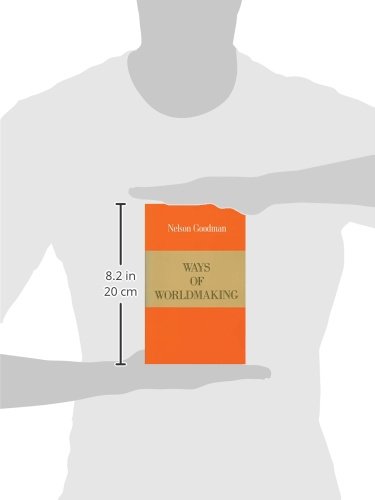Customer Services
Copyright © 2025 Desertcart Holdings Limited



Full description not available
H**R
Goodman and Anti-Realism
Goodman is neither a realist nor an anti-realist. He argues neither for nor against the existence of a real world out beyond all our knowledge and our active efforts to cope with our experiences. He calls himself an "irrealist," or someone who couldn't care less whether or not such a real world exists.Ways of Worldmaking contains one brilliant argument after another for the idea that no appeal to a real world beyond our "conceptual schemes" is necessary to understand, or to produce, science and scientific knowledge. What's more, Goodman also shows how art is just as necessary as science if we are to understand ourselves and the world. He explains that neither art nor science is a copy of the world: as the old joke has it, "one of the damn things is enough." Instead both art and science succeed when they provide us with symbols that re-categorize things and people in ways we find useful.It is this usefulness, not a connection to a world beyond all categories, that we actually seek when we generate both theories and artworks. Notice that we do in fact stop our seeking when we achieve this kind of satisfaction. Goodman's neo-pragmatic explanation of how we should investigate the world pays close attention, and gives proper respect, to the ways in which we actually do investigate.A wonderful book from an underappreciated thinker.
H**K
Extraordinary Genius
This is a book about the fundaments of a General Theory of Symbols, the philosophical fundaments of a very thorough study on symbols and their use in Art, Science, Perception, and most human activities. Written by one of the most intelligent and creative philosophers of de 20th century it requires a lot of philosophical acumen to understand it. Not for the layman or the pregraduate student, it requires an understanding of philosophical logic and the problems of the philosophy of science, induction, and aesthetics Most commentators do not really understand the thesis exposed let alone the argumentation.
N**E
Not fully coherent as a philosophy
Although the author clearly has some aptitude in philosophical writing, it comes across as a work of arbitrary aesthetics. It begins with what look like some very intriguing arguments about objectivity, and then gradually dissolves into discussions of aesthetics and syntax. I was disappointed that there was not a more coherent position. I will not give it four stars because I do not plan to make much use of it, given that it is so devoted to aesthetics. The author made a valiant effort, but failed his purpose on this writing, even though some of his arguments are intriguing.
P**Y
Good. What I ordered
Good. What I ordered.
B**E
Four Stars
required reading for school
Í**S
Excellent book. Indispensable reading and reflection
Excellent book.Indispensable reading and reflection.
W**N
Also called playing with metanarratives
"The non-Kantian theme of multiplicity of worlds is closely akin to the Kantian theme of the vacuity of the notion of pure content. The one denies us a unique world, the other the common stuff of which worlds are made. Together these theses defy our intuitive demand for something solid underneath, and threaten to leave us uncontrolled, spinning out our own inconsequent fantasies." (...) "Truth, far from being a solemn and severe master, is a docile and obedient servant. The scientist who supposes that he is single-mindedly dedicated to the search for truth deceives himself. He is unconcerned with the trivial truths he could grind out endlessly; and he looks to the multifaceted and irregular results of observations for little more than suggestions of overall structures and significant generalizations. He seeks system, simplicity, scope; and when satisfied on these scores he tailors truth to fit. He as much decrees as discovers the laws he sets forth, as much designs as discerns the patterns he delineates." (...) MY notes: this seems to exhibit the influence of the later Wittgenstein. There are several quotes to this effect. "...while readiness to recognize alternative worlds may be liberating, and suggestive of new avenues of exploration, a willingness to welcome all worlds builds none. ... A broad mind is no substitute for hard work." (p. 21) From the footnote on (...): "Even though a metaphorical statement may be literally false, metaphorical truth differs from metaphorical falsity much as literal truth differs from literal falsity." Chapter III is an interesting discussion of the nature of quotation which could come in handy during discussions of plagiarism. Chapter V - the puzzle about perception seems to deal with issues contemporary brain science has better answers for. But VI - The Fabrication of Facts looks like a good chapter. "...we must distinguish falsehood and fiction from truth and fact; but we cannot, I am sure, do it on the ground that fiction is fabricated and fact found." (...) There is a nice (and very useful) summary of the ancients searching for the arche from (...) (Some ancient worlds). Note the quote from "Professor" Woody Allen on (...) and G's interpretation of it. Here is something important I think: "Incidentally, recognition of multiple worlds or true versions suggests innocuous interpretations of necessity and possibility. A statement is necessary in a universe of worlds or true versions if true in all, necessarily false if true in none, and contingent or possible if true in some." (...)
A**R
Confusion
Although Goodman is generally attributed as on of the leaders of the Anti-Realist position, Ways of Worldmaking does not provide a good argument for that position. Goodman's talk is highly open to interpretation, but most interpretations lead to trivial truth or outlandishly bizarre scenarios. The lack of detailed argument makes refutation difficult, but still it is a must read for those interested in what Anti-Realism is.
K**U
Underlines
Four pages covered with underlines
A**R
Five Stars
Bargain
D**S
Three Stars
Interesting book - rapid delivery, crazy low price!
Trustpilot
1 week ago
1 month ago